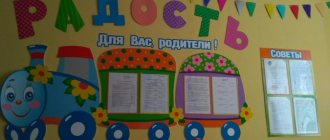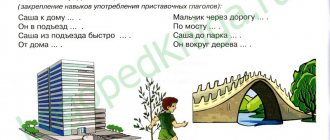The importance of individual consultations for parents and the specifics of their implementation
Maria Moskina
The importance of individual consultations for parents and the specifics of their implementation
The Federal State Educational Standard for Education says that an individual approach is necessary not only when working with children, but also when working with parents . The teacher, when communicating with parents , must feel the situation, the mood of mom or dad. This is where the teacher’s human and pedagogical ability to reassure the parent , sympathize and think together about how to help the child in a given situation comes in handy.
One of the forms of work that helps to implement an individual approach both in working with a child and his family is individual counseling . Part of the consultation is devoted to children's learning difficulties. Individual consultations are close to conversations , their main difference is that the latter involve dialogue, which is led by the organizer of the conversations. The teacher strives to give parents qualified advice and teach something. This form helps to get to know the life of a family more closely and provide help where it is needed most; it encourages parents to take a serious look at their children and think about how to more effectively teach and raise their children.
Individual consultation helps parents and teachers make the overall correct solution to a particular problem that has arisen so as not to harm the child.
For many parents, individual consultation helps them open up . Parents , listening to the teacher, begin to understand the problematic situation as it really looks, and not as they see it from their side.
Preparing for consultation :
- outline a topic, plan;
— prepare content, visibility;
- think about the place and time;
- invite the parent ;
— formulate recommendations.
When preparing for a consultation , it is advisable to identify a number of questions, the answers to which will help plan educational work with the group. Individual consultation should be informational in nature and contribute to the creation of good contact between parents and teacher . The teacher must give parents the opportunity to tell him everything that they would like to introduce the teacher to in an informal setting, and find out important information for their professional work with the child: the child’s health characteristics , his hobbies, interests, preferences in communication in the family, behavioral reactions, character traits , learning motivations, family moral values.
Contents of the consultation .
The consultation can be organized in the form of a conversation, discussion of a problem, an article (read in advance, questions and answers. The content of the consultation consists of an introduction, the main part and a conclusion. The content is specified in detail.
Requirements for consultation .
-Consultation is carried out in the evening and in the absence of the child.
-The consultation is carried out without haste and in a friendly manner.
-It is important to win over the parent .
-The consultation is initiated by the preschool educational institution , but can be carried out at the request of the parent .
When inviting parents for an individual consultation, you need to behave correctly. Always smile. A smile is a small key to positive emotions and easy communication. Be sure to address your parents by name and patronymic. Always know how to listen and hear, listen without interrupting. Look at the problem that has arisen through the eyes of the parents , and not just with your own eyes, then you can see which side is better to approach this problem, how to correctly present its solution without damage to the child and his parents .
Emotions play a big role in . Parents may be constrained, or, on the contrary, impulsive. The teacher must find a special approach for an individual consultation to take place . It is necessary to choose the intonation of your voice, be attentive, and polite. When talking, look at your parents and not to the side. The relationship must be trusting. Under these conditions, individual consultation brings great benefits when working with parents .
Thus, we came to the following conclusion: working with parents is a complex and important part of a teacher’s activity. Individual consultations are a form of teacher work with parents of preschool children. The purpose of the consultations is to increase the pedagogical literacy of parents on the issues of raising and educating the child, solving problematic issues, enhancing the pedagogical skills of parents , helping parents in resolving difficult pedagogical situations, informing about the successes and achievements of the child. Emotions play a big role in . Therefore, the teacher must be able to find a special approach to each parent in order for an individual consultation to take place .
Recommendations for parents on the topic of the week
Dear parents!
Theme of the week from 14.09 – 18.09 “Gifts of autumn.” “Where did the bread come from?”
Target:
develop cognitive interest, interest in school, in books. To consolidate children's knowledge about school, why they need to study, who teaches what at school, about school supplies, etc. to form positive ideas about the teacher’s profession and the “profession” of the student.
This week's final event:
holiday "Day of Knowledge"
Contents of educational activities:
Cognitive development (the world around us)
"Day of Knowledge"
Target
: expand children’s ideas about school; show children the social significance of the holiday - Knowledge Day; introduce school supplies; develop speech, thinking, memory of children; cultivate interest in educational activities, bring joy, create a cheerful festive mood. Develop independence and initiative, artistic and aesthetic taste; cultivate neatness, friendliness and a caring attitude towards people.
Cognitive development (FEMP)
Introductory lesson.
Target:
The teacher conducts didactic games to clarify children’s knowledge in the field of mathematics (quantity, shape, color).
"School Supplies"
Target:
The teacher conducts didactic games to clarify children’s knowledge in the field of mathematics (quantity, shape, color).
Speech development
"Preparations."
Target:
talk with the children about what their group is called now and why, and whether they want to become students. Help children construct sentences correctly.
"Summer Stories".
Target:
help children compose stories from personal experience, select nouns for adjectives.
Artistic and aesthetic development (sculpting)
"Fruits for playing in the store
Target:
learn to convey the shape and characteristic features of fruit when sculpting from life, use familiar sculpting techniques: pulling, smoothing, etc. Refine knowledge of shapes (ball, cylinder). Learn to compare the image with nature and evaluate it in accordance with how nature is conveyed in sculpting.
Artistic and aesthetic development (drawing)
"Summer".
Target:
reflect your impressions of summer (convey the content of the song) in a drawing, placing the images on a wide strip: higher, lower on the sheet (closer, further). Strengthen the techniques of working with a brush and paints, the ability to compose the desired shades of color on the palette, using watercolor and white for mixing. Learn to talk about what you drew.
Musical development
According to the music director's plan
Physical development
Outdoor games
To carry out educational activities on the topic
"Knowledge Day" is recommended:
Preparatory group. Senior preschool age. Children 6-7 years old
Consultation for parents “Why is it worth sending your child to the pool before the age of 7?” Parents often ask the question , when is the best time to send their child to the pool? The answer is actually simple - when the child is ready, when you want it and are ready, when you find the right pool for you. There are no special restrictions. There is only your decision. Recommended…
Consultation for parents “Development of logical thinking in children of senior preschool age through mathematics” Dear parents ! An entertaining mathematical game is a purposeful cognitive activity, during which children most effectively experience the process of intellectual development, as well as logical thinking. During the game, children learn complex...





